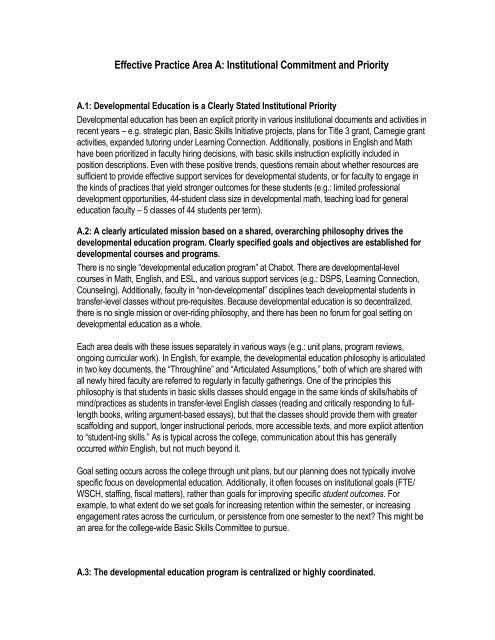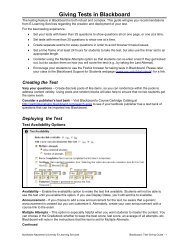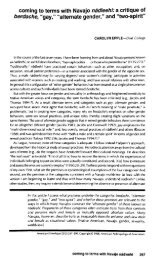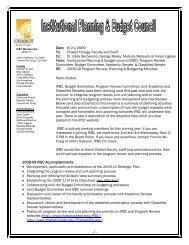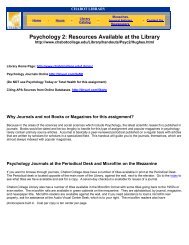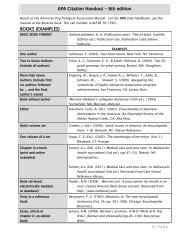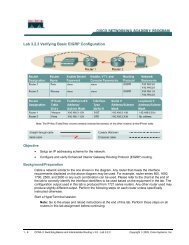BSI Self-Assessment Summary.rtf - Chabot College
BSI Self-Assessment Summary.rtf - Chabot College
BSI Self-Assessment Summary.rtf - Chabot College
Create successful ePaper yourself
Turn your PDF publications into a flip-book with our unique Google optimized e-Paper software.
Effective Practice Area A: Institutional Commitment and Priority<br />
A.1: Developmental Education is a Clearly Stated Institutional Priority<br />
Developmental education has been an explicit priority in various institutional documents and activities in<br />
recent years – e.g. strategic plan, Basic Skills Initiative projects, plans for Title 3 grant, Carnegie grant<br />
activities, expanded tutoring under Learning Connection. Additionally, positions in English and Math<br />
have been prioritized in faculty hiring decisions, with basic skills instruction explicitly included in<br />
position descriptions. Even with these positive trends, questions remain about whether resources are<br />
sufficient to provide effective support services for developmental students, or for faculty to engage in<br />
the kinds of practices that yield stronger outcomes for these students (e.g.: limited professional<br />
development opportunities, 44-student class size in developmental math, teaching load for general<br />
education faculty – 5 classes of 44 students per term).<br />
A.2: A clearly articulated mission based on a shared, overarching philosophy drives the<br />
developmental education program. Clearly specified goals and objectives are established for<br />
developmental courses and programs.<br />
There is no single “developmental education program” at <strong>Chabot</strong>. There are developmental-level<br />
courses in Math, English, and ESL, and various support services (e.g.: DSPS, Learning Connection,<br />
Counseling). Additionally, faculty in “non-developmental” disciplines teach developmental students in<br />
transfer-level classes without pre-requisites. Because developmental education is so decentralized,<br />
there is no single mission or over-riding philosophy, and there has been no forum for goal setting on<br />
developmental education as a whole.<br />
Each area deals with these issues separately in various ways (e.g.: unit plans, program reviews,<br />
ongoing curricular work). In English, for example, the developmental education philosophy is articulated<br />
in two key documents, the “Throughline” and “Articulated Assumptions,” both of which are shared with<br />
all newly hired faculty are referred to regularly in faculty gatherings. One of the principles this<br />
philosophy is that students in basic skills classes should engage in the same kinds of skills/habits of<br />
mind/practices as students in transfer-level English classes (reading and critically responding to fulllength<br />
books, writing argument-based essays), but that the classes should provide them with greater<br />
scaffolding and support, longer instructional periods, more accessible texts, and more explicit attention<br />
to “student-ing skills.” As is typical across the college, communication about this has generally<br />
occurred within English, but not much beyond it.<br />
Goal setting occurs across the college through unit plans, but our planning does not typically involve<br />
specific focus on developmental education. Additionally, it often focuses on institutional goals (FTE/<br />
WSCH, staffing, fiscal matters), rather than goals for improving specific student outcomes. For<br />
example, to what extent do we set goals for increasing retention within the semester, or increasing<br />
engagement rates across the curriculum, or persistence from one semester to the next? This might be<br />
an area for the college-wide Basic Skills Committee to pursue.<br />
A.3: The developmental education program is centralized or highly coordinated.


